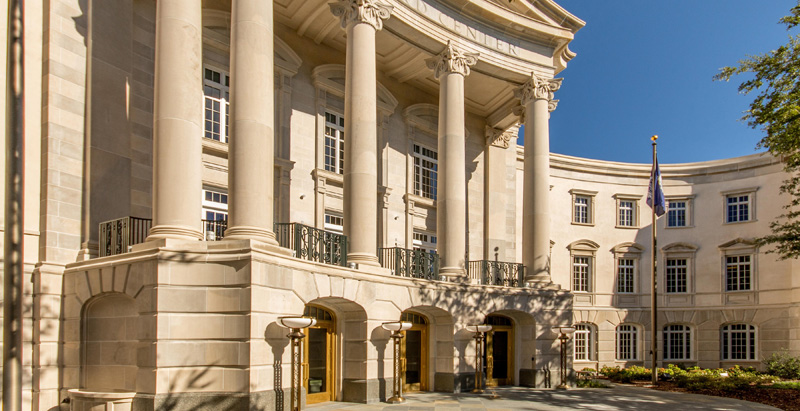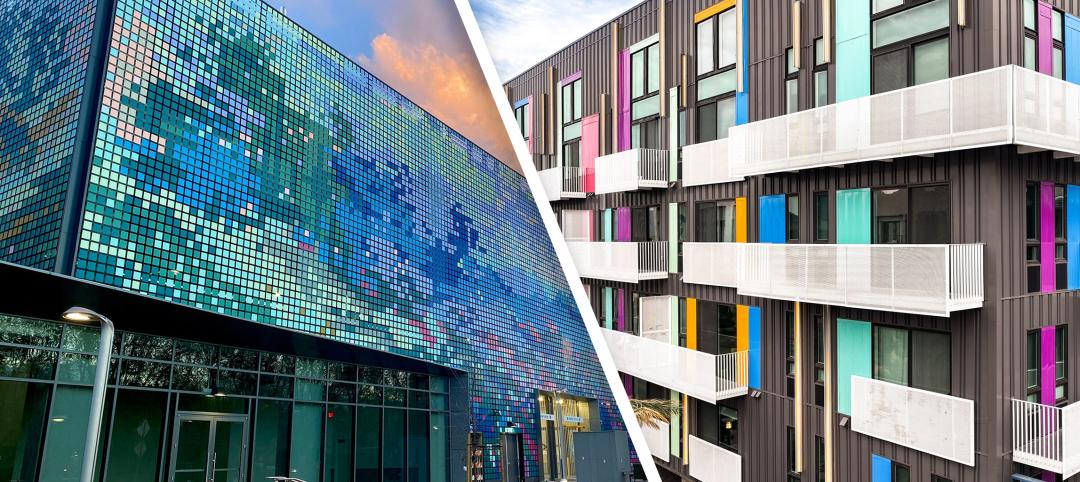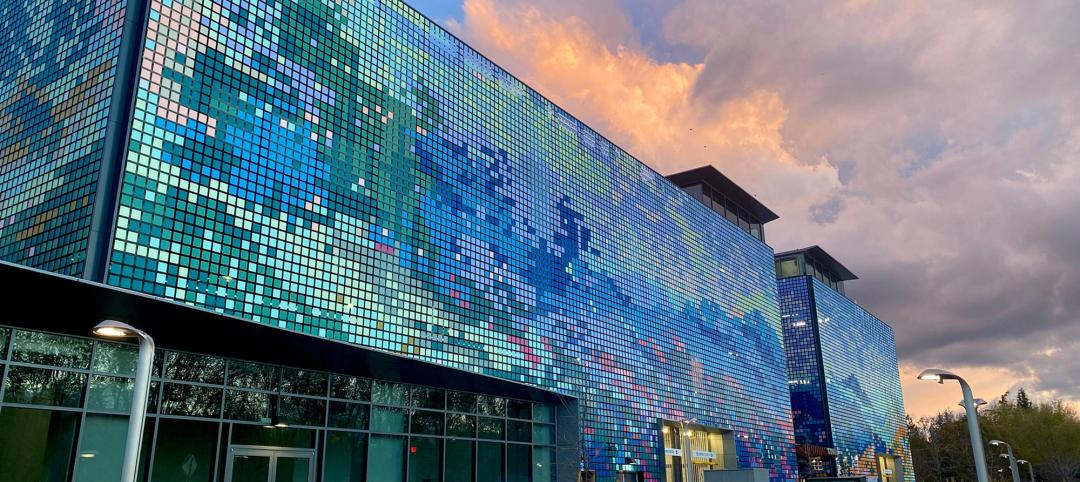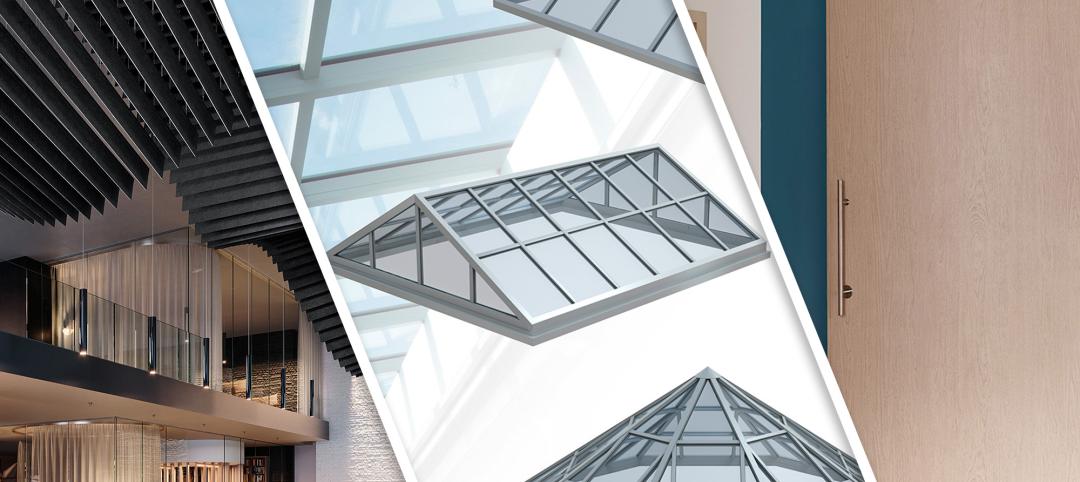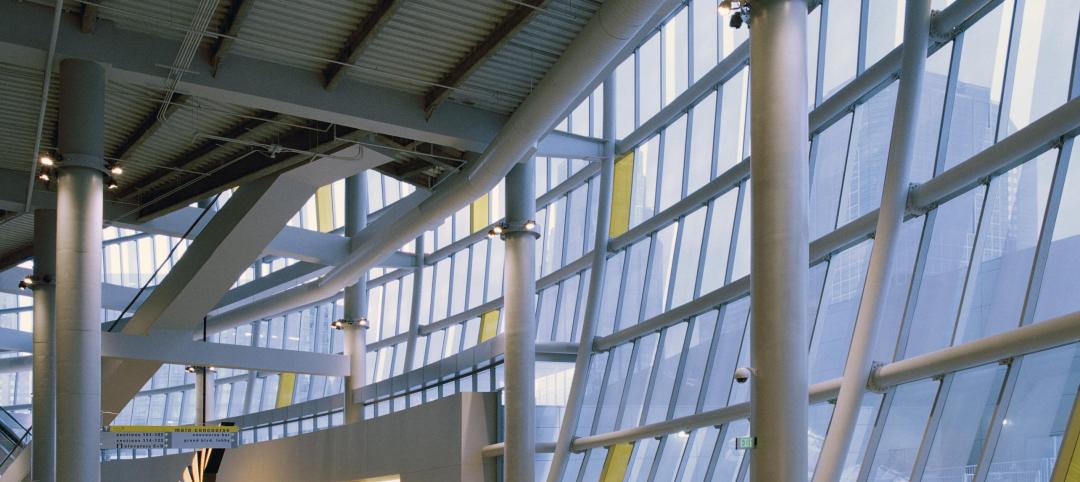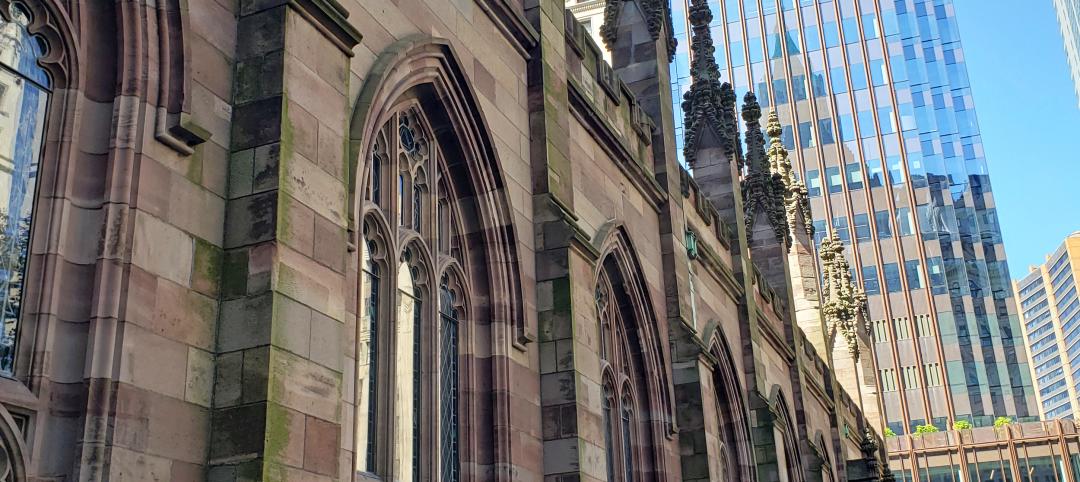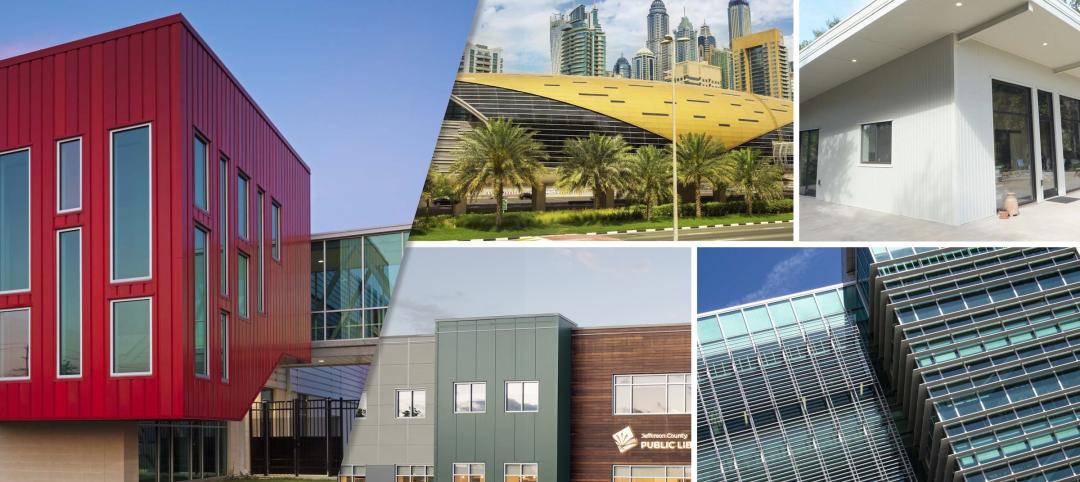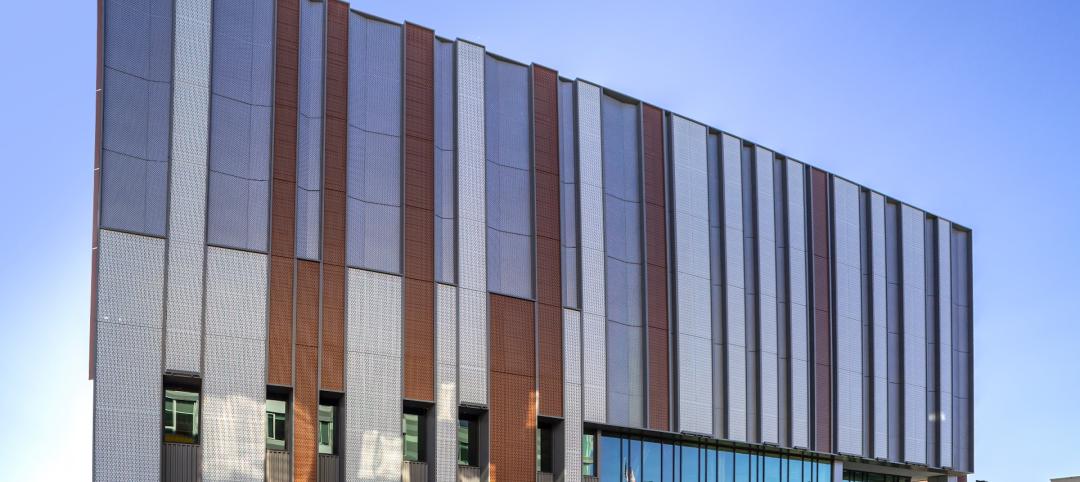A unique private-public cooperation allowed the city of Charleston, S.C. to build the new $142-million neo-classical Gaillard Center. Plans included a performance hall not unlike old European opera houses, a user-friendly convention center and various municipal offices, as well.
A massive undertaking of new construction and renovation “stripped” the then-prevailing Gaillard Auditorium and subsequently built the new center on its former framework. The “new construction” surrounds three sides of the original building, offering both a classic public structure and exquisite outdoor spaces—totally in synch with Charleston's heralded architectural tradition. Clearly, one of the focal points of this signature project was the selection of cladding, designed to wrap around the building’s exterior façade.
A decision was made to incorporate Thermocromex™ on the building’s exterior. A unique, ultra-high-performance limestone plaster cladding, Thermocromex is an advanced technical re-formulation that can be applied to virtually any substrate, including CMU, frame/sheathing, tilt wall, poured-in -place concrete and lightweight blocks/cement.
According to Steve Knight, Design Architect from Washington DC’s David Schwarz/Architectural Services, Inc. “It was of vital importance for the City of Charleston to make this building fit into the fabric of the City, and this meant a more traditionally-inspired aesthetic. That’s why we absolutely needed the right cladding material.
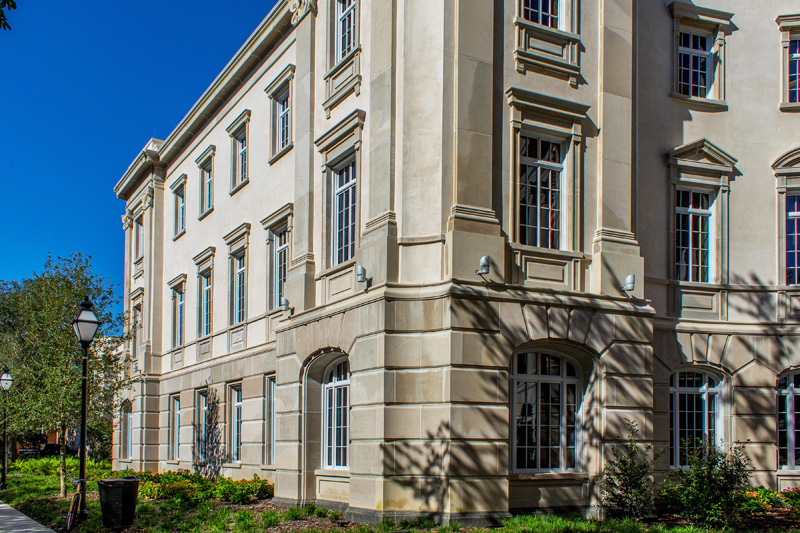
“The City wanted to make the building bigger, expanding it with a music hall, city offices, administration and hospitality/banquet facilities,” continued Knight. “Turning the Gaillard into a state-of-the-art, multiuse building, while making it compatible with the surrounding neighborhood was a major mandate. Some features of the original building were grandfathered, including the stage house, which exceeded the height limit allowed by current zoning. Charleston has a lot of buildings covered in stucco. Why? Because in 1886, there was an earthquake and stucco was used to cover all cracks in the brick buildings. So, that stucco aesthetic was a major inspiration. Control joints are okay for maintenance,” continued Knight, “but not for aesthetics. They would produce an undesirable, negative impact on the design. That’s one main reason we selected Thermocromex!
“Thermocromex is limestone-based versus Portland cement-based stucco. Because limestone is softer than Portland cement, it allows for more movement without cracking… and, no need for control joints! Additionally, Thermocromex’s integral color offers slight variation, which is great for the coverage of such a large building, offering a slightly mottled appearance adding warm visual interest. And, ‘limestone-based’ plaster is both new/old at the same time,” Knight continued. “It’s a material although used in Europe for hundreds of years, the spray-on application of Thermocromex is modern and efficient. ”Thermocromex addresses movement, vapor and moisture barrier issues, as well. It provides clean, smooth and uninterrupted monolithic masonry look.”
Thermocromex’s highly professional technical staff traveled to Charleston and trained applicators from Horus Construction regarding best possible installation techniques. These speak for themselves.
“When it comes to delivering a professional application, we won’t cut corners,” stated James Reed, Thermocromex sales manager. “A main goal for the Gaillard, was that it was to last and be enjoyed for ‘more than a century.’ We were confident that lofty demand would be met, as Thermocromex will basically, last forever,” he exclaimed. “It requires no other coloring or top coat. The alkali- and UV-resistant pigments will not fade over time, and the finish is both weatherproof and breathable. Almost no maintenance is required to keep the original appearance, year after year after year. We are very confident that Charleston’s investment in the application of Thermocromex for the ‘new’ Gaillard will pay major dividends moving forward!”
Related Stories
Products and Materials | Aug 31, 2023
Top building products for August 2023
BD+C Editors break down 15 of the top building products this month, from frameless windscreens to smart fixture mount sensors.
Transportation & Parking Facilities | Aug 23, 2023
California parking garage features wind-activated moving mural
A massive, colorful, moving mural creatively conceals a newly opened parking garage for a global technology company in Mountain View, Calif.
Products and Materials | Jul 31, 2023
Top building products for July 2023
BD+C Editors break down 15 of the top building products this month, from cleanroom doors to window storm protection systems.
Sponsored | Fire and Life Safety | Jul 12, 2023
Fire safety considerations for cantilevered buildings [AIA course]
Bold cantilevered designs are prevalent today, as developers and architects strive to maximize space, views, and natural light in buildings. Cantilevered structures, however, present a host of challenges for building teams, according to José R. Rivera, PE, Associate Principal and Director of Plumbing and Fire Protection with Lilker.
Cladding and Facade Systems | Jun 5, 2023
27 important questions about façade leakage
Walter P Moore’s Darek Brandt discusses the key questions building owners and property managers should be asking to determine the health of their building's façade.
Sponsored | Building Enclosure Systems | May 16, 2023
4 steps to a better building enclosure
Dividing the outside environment from the interior, the building enclosure is one of the most important parts of the structure. The enclosure not only defines the building’s aesthetic, but also protects occupants from the elements and facilitates a comfortable, controlled climate. With dozens of components comprising the exterior assemblies, from foundation to cladding to roof, figuring out which concerns to address first can be daunting.
Metals | Apr 19, 2023
Sherwin-Williams Coil Coatings releases new color forecast for architectural metal coatings
The Coil Coatings division of Sherwin-Williams has released its latest color forecast, FUSE, for architectural metal coatings. The report aims to inspire architects, product manufacturers and original equipment manufacturers (OEMs) in the coil and extrusion market over the next 3-5 years and beyond.
Cladding and Facade Systems | Apr 5, 2023
Façade innovation: University of Stuttgart tests a ‘saturated building skin’ for lessening heat islands
HydroSKIN is a façade made with textiles that stores rainwater and uses it later to cool hot building exteriors. The façade innovation consists of an external, multilayered 3D textile that acts as a water collector and evaporator.
Sponsored | Cladding and Facade Systems | Mar 15, 2023
Metal cladding trends and innovations
Metal cladding is on a growth trajectory globally. This is reflected in rising demand for rainscreen cladding and architectural metal coatings. This course covers the latest trends and innovations in the metal cladding market.
Cladding and Facade Systems | Dec 20, 2022
Acoustic design considerations at the building envelope
Acentech's Ben Markham identifies the primary concerns with acoustic performance at the building envelope and offers proven solutions for mitigating acoustic issues.


